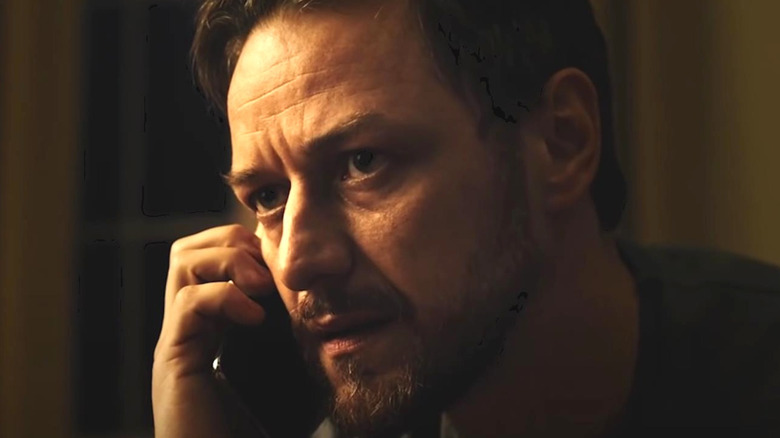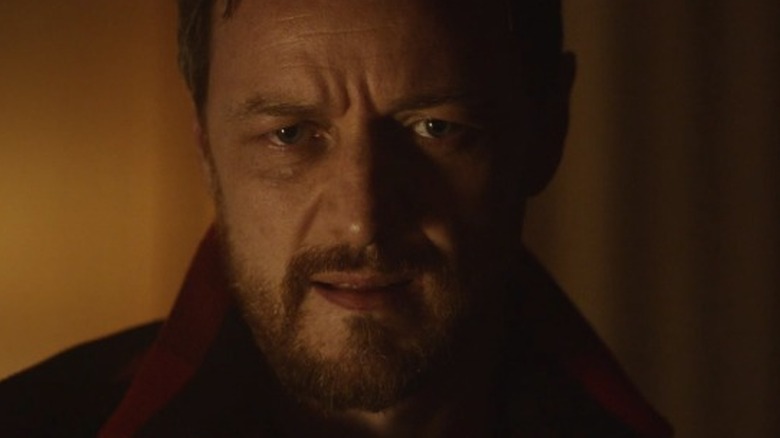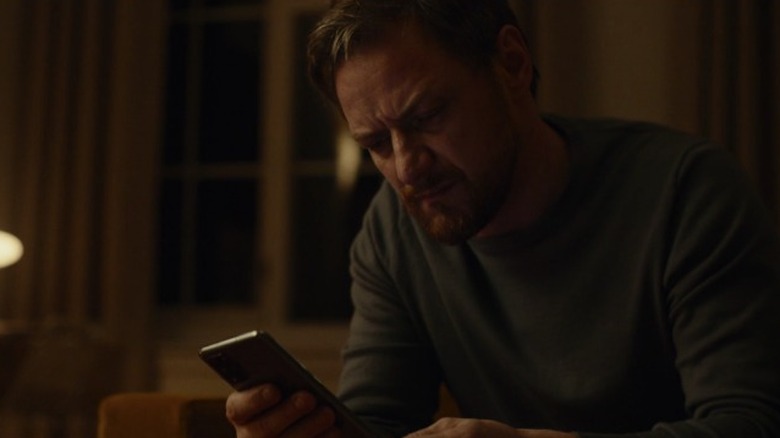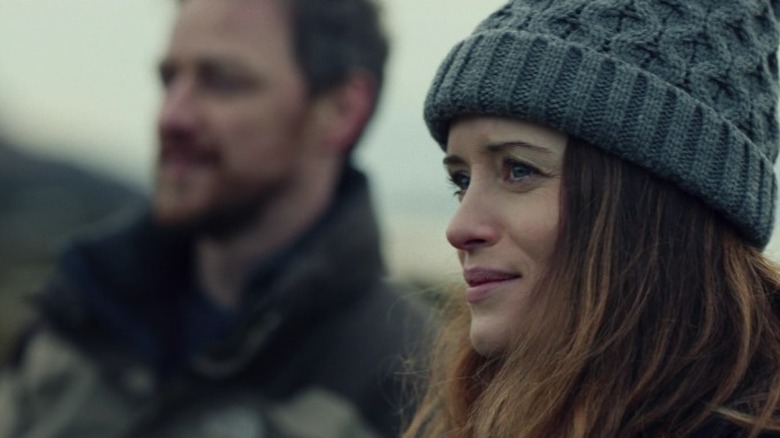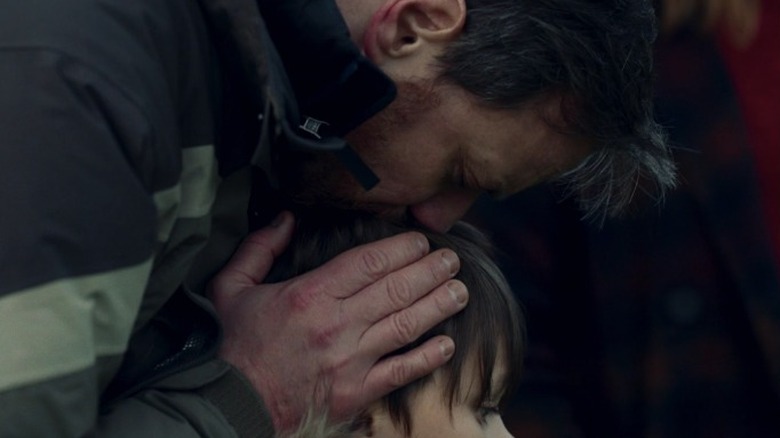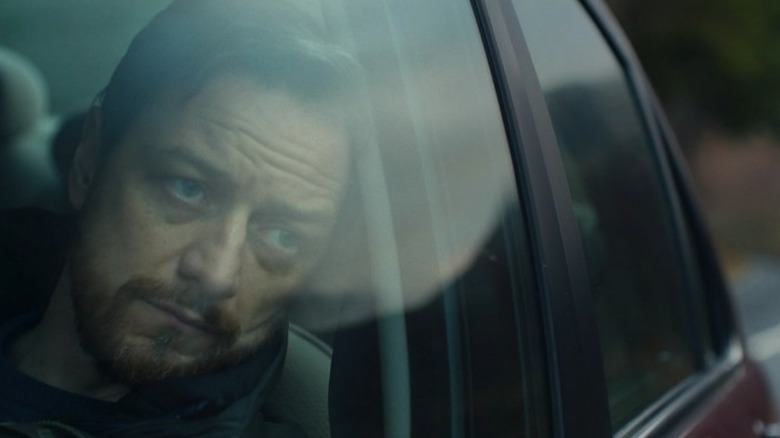The Ending Of My Son Explained
"My Son" is one of those movies that critics will likely love and audiences will only either love or hate. Not, mind you, because it has a particularly polarizing or surrealist plot (Darren Aronofsky's "Mother" it is not) but because it contains the kind of impressionistic character studies and "leaps in logic," as one reviewer writes, that audiences tend to get hung up on (via Rotton Tomatoes). To be clear, none of this appears to be lost on (or even particularly matter to) the film's director and co-writer Christian Carion. That's because the film — which debuted on NBCUniversal's streaming service Peacock on September 15th — is as much an exercise in tension and the nuances and inconsistencies of human behavior as it is an actual film.
The basic narrative structure of "My Son" is nothing new. In fact, the film itself is not new at all, but a remake of Carion's 2017 French language film by the same. In the vein of (and yet entirely distinct from) more traditional "papa wolf"-driven narratives such as "Taken" and "Kidnap," "My Son" follows a previously absentee father's quest to locate his missing 7-year-old son Ethan (Max Wilson), who disappeared from a campsite in the Highlands of Scotland. James McAvoy plays said absentee father, Edmond Murray, opposite "The Crown" star Clare Foy, who plays Murray's ex-wife Joan. The police can't do anything to help, Murray has "special skills/experience," and he must grapple with the fact that a new man (Frank, played by Tom Cullen) has taken over his role as his son's father and his ex's partner. Also, Murray ends up torturing and killing some bad guys. Typical, right? Well, it is and it isn't.
James McAvoy wasn't given a script
Importantly (or not, depending on whether or not the viewer is aware of this ahead of time) James McAvoy wasn't given a script at any point during the filming of "My Son." As he says in a fourth-wall breaking trailer for the movie available on YouTube, "I get to have an experience that no actor gets to have," because (as the trailer states) "both actor and audience uncover the mystery at the exact same time." While McAvoy was given the "basic aspects of his character's story," every other actor on set was given a script (via The Hollywood Reporter), as was the case in Carion's original French version. Thus, what viewers are seeing any time McAvoy is on screen are his actual improvised reactions to whatever information his character receives or to the various predicaments, decisions, or uncomfortable conversations with which he's faced or into which he's thrown.
Adding to this, McAvoy's improvisations never read as such, meaning that if a viewer was unaware of the manner in which "My Son" was filmed, they'd never know its protagonist has no more information than they do at any given point. This is important not because it speaks to McAvoy's already well-established abilities as an actor (see: "Split"), but because it goes a long way in defining the movie as more of an experiment in tension and character than an actual narrative.
The film — and its ending — are less concerned with telling an infallible story from start to finish and more concerned with how an actor will react or behave while in the skin of a character who's as informed by the actor's own understanding of a given situation as it is by the surrounding narrative and characters' lines/behaviors.
My Son foreshadows its end note in a sneaky way
That revolutionary redirection of concern doesn't come without (what could be seen as) a cost to the plot. By now, viewers are well-versed in the language of this kind of film, and it's a language that "My Son" speaks — intentionally — inconsistently. In one of the more harrowing scenes in the film, a suspicious Murray decides to scroll through the videos on his "replacement" Frank's phone, only to find video of yet another birthday party he missed in his son's life. As Murray repeatedly watches Frank attempt to cheer up an unhappy, socially apprehensive and perpetually sullen Ethan, he begins to fully understand the impact his absence has had on his son (all while fully aware that he may never see that son again).
McAvoy navigates the scene with such gut-wrenchingly genuine emotion that it borders on difficult to watch. His Murray tries helplessly to engage with the recording of his son — a mere image of him — and goes back and forth between abject despair and laughing through tears at his Ethan's more endearing antics. The knowledge that McAvoy didn't know ahead of time what he'd find on Frank's phone informs viewers' appreciation of the star's abilities, but it's his reaction to what he finds that lays the foundation for an utterly heartbreaking ending.
McAvoy determines the ending
Oddly enough, Carion's Scottish ending differs from the original French version. Although the father is still taken to prison in the latter (because like, you really can't just torture and kill people, regardless of the circumstance), the broken French family appears to make far more optimistic amends. In other words, while the original ends on a relative high note, the remake clearly does not, bringing the notion of the film as a vehicle or platform for character study into even starker relief.
In the penultimate scene of "My Son," the camerawork — namely, which parent the camera chooses to pull into focus — appears to take its lead from McAvoy's actions, which determine the tone of the film's ending. While the original's Guillaume Canet read the scene (wherein father, mother, and son are reunited after having narrowly escaped death) as a suggestion that the estranged pair have a potential future, McAvoy does not. In fact, his prison-bound Murray appears to have long since let that dream die, and it's hard not to retrospectively view the scene with Frank's cell phone videos as that dream's proverbial coffin nail.
The actor's decision to see Murray's final scene with his son and ex-wife as both an apology and a goodbye directly affects the cinematographic mechanics that follow. The father's continual recession into background blur mimics the inconsistent and intangible presence he has in his son's life — even after nearly losing him. That the two versions of the film would end on such disparate notes is further proof that Carion genuinely is taking his cue from the improvisations of his leads, even as they endeavor to take their cues from Carion's set-ups and their co-stars' behaviors.
Who is Christian Carion's experiment for?
Of course, none of that comes through for any viewer who can't use the original incarnation as a basis of comparison and isn't aware of Carion's technique. Though the percentage of audiences who'll fall into the latter category will no doubt grow increasingly smaller as the movie continues to gather reviews and viewers, it nonetheless begs the question as to just who, exactly, Carion's psychological experiment is meant to benefit.
Clearly, he wanted viewers to be thinking about the fact that McAvoy wasn't given a script, or he wouldn't have put that information in the film's trailer. But while it's an intriguing approach that undoubtedly benefits McAvoy (who says as much, in the trailer) and necessarily impacts the direction of the narrative, it's an experiment that isn't — on the surface, at least — a necessary element in terms of how the film strikes its audience.
That said, Carion's insistence on improvisation attempts to answer age-old questions about filmmaking, tension, and realism/the suspension of disbelief.
"My Son" explores the relationship between film and reality
"My Son" uses realistic, non-cinematic action (the literal opposite of "Taken") to help increase its tension. If "Uncut Gems" was an extended panic attack on film, "My Son" is a suffocating, sustained, quiet descent into the kind of prolonged anxiety that comes from never knowing what's around the corner. Whether the viewer knows why or how this tension was built has no affect on the fact that it is built — and to an unnervingly effective degree. Attempting to understand the degree to which certain kinds of tension can or cannot be faked, Carion's experiment is wildly successful.
Finally, Carion's method and the fact that it has such an enormous impact on his intentionally unsatisfying and hyper-realistic end note — Murray gets his son back only to immediately lose him again — is an important piece of research with regard to the future of moviemaking. As audiences grow more desirous of new ways to receive stories, Carion's reliance on McAvoy to determine the film's next moves by reacting rather than acting offers a fresh, twofold approach to storytelling. It gives audiences an intensely intimate yet entertaining investigation of "human" behavior, and it explores to what degree an actor takes their cues from lived experience and impulse vs the numerous, long-established mechanics of the language of film. "My Son" and its non-predetermined ending ask the question of whether or not art imitates life, or vice versa.
In McAvoy's final moments on screen, he watches his son's new toy drone follow the cop car he's in for a short time before disappearing altogether. It's a scene that's difficult not to see as representative of the filmmaker and writer's own relationship to an improvising actor: McAvoy is, and isn't, being watched. Moreover, unlike the drone, the character doesn't have a bird's eye view of his own narrative.
